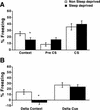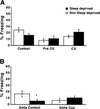Sleep deprivation selectively impairs memory consolidation for contextual fear conditioning
- PMID: 12773581
- PMCID: PMC202307
- DOI: 10.1101/lm.48803
Sleep deprivation selectively impairs memory consolidation for contextual fear conditioning
Abstract
Many behavioral and electrophysiological studies in animals and humans have suggested that sleep and circadian rhythms influence memory consolidation. In rodents, hippocampus-dependent memory may be particularly sensitive to sleep deprivation after training, as spatial memory in the Morris water maze is impaired by rapid eye movement sleep deprivation following training. Spatial learning in the Morris water maze, however, requires multiple training trials and performance, as measured by time to reach the hidden platform is influenced by not only spatial learning but also procedural learning. To determine if sleep is important for the consolidation of a single-trial, hippocampus-dependent task, we sleep deprived animals for 0-5 and 5-10 h after training for contextual and cued fear conditioning. We found that sleep deprivation from 0-5 h after training for this task impaired memory consolidation for contextual fear conditioning whereas sleep deprivation from 5-10 h after training had no effect. Sleep deprivation at either time point had no effect on cued fear conditioning, a hippocampus-independent task. Previous studies have determined that memory consolidation for fear conditioning is impaired when protein kinase A and protein synthesis inhibitors are administered at the same time as when sleep deprivation is effective, suggesting that sleep deprivation may act by modifying these molecular mechanisms of memory storage.
Figures




References
-
- Abel, T. and Lattal, K.M. 2001. Molecular mechanisms of memory acquisition, consolidation and retrieval. Curr. Opin. Neurobiol. 11: 180–187. - PubMed
-
- Abel, T., Nguyen, P.V., Barad, M., Deuel, T.A.S., Kandel, E.R., and Bourtchouladze, R. 1997. Genetic demonstration of a role for PKA in the late phase of LTP and in hippocampus-based long-term memory. Cell 88: 615–626. - PubMed
-
- Bernabeu, R., Bevilaqua, L., Ardenghi, P., Bromberg, E., Schmitz, P., Bianchin, M., Izquierdo, I., and Medina, J.H. 1997. Involvement of hippocampal cAMP/cAMP-dependent protein kinase signaling pathways in a late memory consolidation phase of aversively motivated learning in rats. Proc. Natl. Acad. Sci. 94: 7041–7046. - PMC - PubMed
-
- Blanchard, R.J. and Blanchard, D.C. 1969. Crouching as an index of fear. J. Comp. Physiol. Psychol. 67: 370–375. - PubMed
-
- Bourtchouladze, R., Abel, T., Berman, N., Gordon, R., Lapidus, K., and Kandel, E.R. 1998. Different training procedures for contextual memory in mice can recruit either one or two critical periods for memory consolidation that require protein synthesis and PKA. Learn. Mem. 5: 365–374. - PMC - PubMed
Publication types
MeSH terms
Grants and funding
LinkOut - more resources
Full Text Sources
Medical
